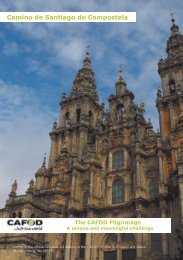Religious Education Curriculum Directory (3-19) - The Catholic ...
Religious Education Curriculum Directory (3-19) - The Catholic ...
Religious Education Curriculum Directory (3-19) - The Catholic ...
- No tags were found...
You also want an ePaper? Increase the reach of your titles
YUMPU automatically turns print PDFs into web optimized ePapers that Google loves.
<strong>Catholic</strong> Bishops’ Conference of England and Wales — Department of <strong>Catholic</strong> <strong>Education</strong> and FormationBCDUnderstanding the sacramenta Scriptural basis: <strong>The</strong> Eucharist is pre-figuredin the Old Testament, beginning with thepriest-king Melchizedek (Gen 14:18-20), Israeleating unleavened bread every year atPassover, and YHWH providing manna fromheaven (Ex 12, 1333, 1544). New Testament references:Mt 14:13-21; Mt 26: 26-29; Mk 6:30-33;Mk 14:22-25; Lk 9:10-17; Lk 22:14-20; Jn 2:1-12;Jn 6:22-59; Jn 13–17; 1 Cor 11:23ff (1337-1344)b Historical development (1324-1332, 1345)c <strong>The</strong>ologyd Signs (1333-1336)e Institution (1337-1340)f ‘In memory’ (1341-1343)g Thanksgiving and praise (1359-1361)h Sacrificial memorial (1362-1372)i Ecclesia de EucharistiaCelebration (1345-1355)a Parts of the Mass (1348-1355)b Roles of priests and deacons (1566, 1570)c Roles of faith community (1140, 1348)Essential elementsa Bread (unleavened in Latin Church, leavenedin Eastern Churches) and wine from grapes(1412; CIC, cc. 924 §§1-3, 926, 927).b Eucharistic Prayer (1352-1355).c Christ’s Real Presence.d Transubstantiation (1373-1377).e Other elements: worship of the Eucharist andBenediction.f Adoration (1378), tabernacle (1379), reverence(1385-1386, 1418)E Effects and implications of the sacrament (1391-1397)a Union with Jesus and Church (1391, 1396)b Forgiveness of venial sin (1394)c Protection from grave sin (1395)d Commits us to the poor (1397)e Ecumenical implications (1398)f Love of God, neighbour, and poor (1396-1397)g Nourishing Christ’s life in us (1392)F Requirements for fruitful receptiona Baptized member of the Church who believesin the Real Presence and Transubstantiation(1376, 1385, 1387-1388)b Free from grave sin (1385)c One hour fast from food and drink (1387)G Other points:a Frequent Communion (1388-1389)b Viaticum (1524-1525)c Eucharist two times a day (CIC, c. 917)d Minister of the sacrament (1369, 1566)e Role of extraordinary ministers of Holy Com-munion (1411; CIC, c. 910 §2, c. 230 §3)H Appropriating and living this sacramenta Active participation in Mass where the Lordcomes in both word and sacrament (2042,2181-2182)b Prayer of thanksgiving on receiving JesusChrist in the Eucharist (1358-1359)c Reflective prayer on the meaning of Christ’sDeath and Resurrection, and petition for thegrace to give to others of ourselves as the Lorddid (1359-1361)3.3.5. What is this Sacrament called? (1328-1332)A Eucharist — a variety of names (1328)a Lord’s Supper, Breaking of Bread, Assembly(1329)b Memorial, Sacrifice, Liturgy (1330)c Communion and Mass (1331-1332)35
















